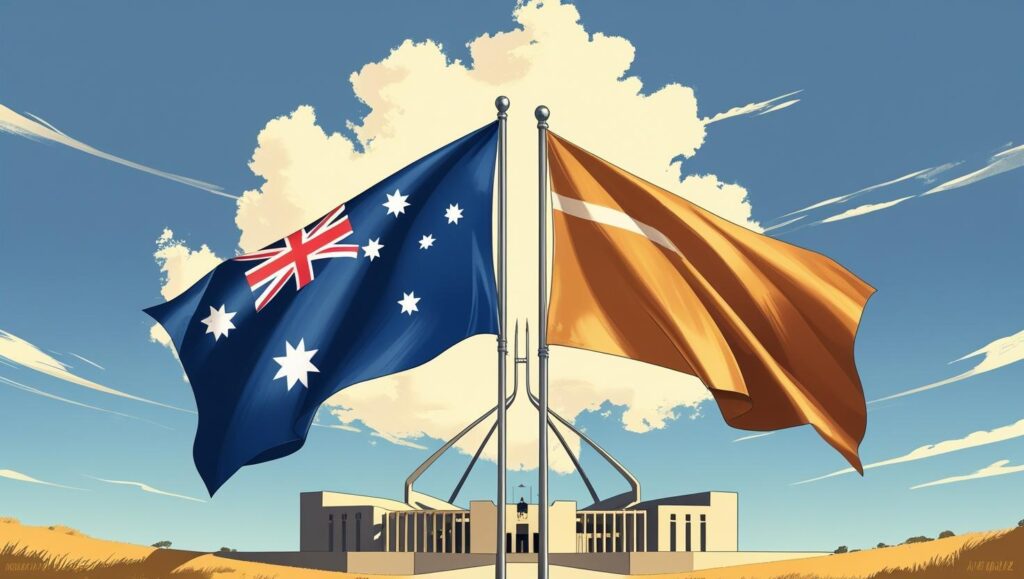
Australia Recognizes Palestinian State – 2025 Impact & Reactions
Australia has officially recognized the Palestinian State in 2025. Learn why this decision matters, its global impact, and how it shapes Middle East diplomacy.
Introduction
In a landmark diplomatic shift, Australia has officially recognized the State of Palestine in 2025, joining more than 140 countries worldwide in affirming Palestinian statehood. This decision marks a historic turning point in Australian foreign policy, potentially reshaping its role in the Middle East peace process and influencing international alliances.
For decades, the Israel–Palestine conflict has been a deeply polarizing issue, with recognition of Palestinian statehood being a critical point of contention. Australia’s move comes amid growing global calls for a two-state solution, heightened regional tensions, and an international push for renewed peace talks.
But what does this recognition actually mean? How will it affect Australia’s relationships with Israel, Palestine, the United States, and other global powers? And most importantly, what could this mean for the people on the ground in Gaza, the West Bank, and beyond?
Let’s break down the details.
Background: Australia’s Stance on Palestinian State in 2025
For years, Australia maintained a cautious approach toward Palestinian statehood. While it supported humanitarian aid and backed some UN resolutions advocating for Palestinian rights, it stopped short of official recognition.
Successive Australian governments expressed support for a two-state solution but argued that recognition should come as part of a negotiated peace settlement between Israel and Palestine. This position aligned with U.S. policy but diverged from many European and developing nations that granted recognition unilaterally.
By late 2024, however, a combination of domestic political shifts, international diplomatic trends, and humanitarian concerns set the stage for a policy overhaul.
Why Australia Decided to Recognize Palestine in 2025
1. Global Diplomatic Momentum
Over 140 UN member states have already recognized Palestine. In 2025, several Western nations — including Ireland, Spain, and Norway — made the move, increasing pressure on others like Australia to follow suit.
2. Domestic Political Pressure
In recent years, Australian public opinion polls showed rising support for Palestinian statehood, particularly among younger voters and multicultural communities. Civil society groups, religious organizations, and political parties on the left pushed for official recognition.
3. Humanitarian Concerns
Escalating violence in Gaza and the West Bank in 2024–2025, coupled with humanitarian crises, prompted calls for stronger political action beyond aid and condemnation.
4. Restoring Australia’s International Reputation
Australia’s foreign policy has sometimes been criticized as too aligned with the U.S. Recognizing Palestine allows Australia to project a more independent and balanced global stance.
The Official Announcement
The Australian Prime Minister, in a press conference in Canberra, declared that Australia would recognize Palestine as a sovereign state based on 1967 borders, including the West Bank, Gaza Strip, and East Jerusalem.
The statement emphasized that recognition:
- Supports a two-state solution as the only path to lasting peace.
- Does not diminish Australia’s commitment to Israel’s right to security.
- Calls on both Israel and Palestine to resume direct negotiations without preconditions.
Foreign Minister comments also made clear that Australia will upgrade its diplomatic mission in Ramallah to a full embassy, signaling long-term commitment.Palestinian State in 2025Palestinian State in 2025Palestinian State in 2025Palestinian State in 2025Palestinian State in 2025Palestinian State in 2025Palestinian State in 2025Palestinian State in 2025Palestinian State in 2025
International Reaction
Supportive Responses
Palestinian leaders welcomed the decision as a significant diplomatic victory. The Palestinian Authority expressed hope that Australia’s move would inspire other holdout countries to follow.
Many Arab and Muslim-majority nations praised Australia’s decision, noting it could strengthen bilateral trade, education exchanges, and cultural ties.
Israeli Response
Israel’s government condemned the move, arguing that unilateral recognition undermines direct negotiations. The Israeli ambassador in Canberra requested urgent consultations with Australian officials.
U.S. and Allied Reactions
The U.S. issued a measured statement, reiterating support for a two-state solution but warning against “premature recognition.” The UK and Canada took note but have not shifted their positions yet.
Impact on Australia’s Foreign Policy
This decision could have far-reaching implications:
- Middle East Relations: Strengthens ties with Arab nations but could strain relations with Israel.
- Trade Opportunities: Opens new economic partnerships with Middle Eastern and North African markets.
- Diplomatic Credibility: Positions Australia as a more independent mediator in global conflicts.
- Defense and Security Concerns: Australia will need to manage its strategic partnerships carefully to avoid alienating key allies.
Humanitarian and Development Aid Commitments
Australia pledged an increase in humanitarian aid to Palestine, focusing on:
- Healthcare support in Gaza hospitals.
- Education initiatives in the West Bank.
- Infrastructure development and clean water projects.
- Women’s empowerment programs.
This aid package is part of a broader soft power diplomacy strategy that aims to back recognition with tangible benefits.
Challenges Ahead
While recognition is a symbolic victory, it does not resolve the core disputes of the Israel–Palestine conflict. Key challenges remain:
- Border Security: How will future borders be defined and enforced?
- Jerusalem’s Status: Still one of the most contentious issues in peace talks.
- Internal Palestinian Politics: Divisions between the Palestinian Authority and Hamas complicate governance.
- Regional Instability: Ongoing conflicts in Lebanon, Syria, and Yemen could spill over.
What This Means for Palestinians in 2025
For Palestinians, recognition brings diplomatic legitimacy but not immediate sovereignty. It strengthens their case in international forums like the United Nations and the International Criminal Court (ICC), but the reality on the ground — checkpoints, settlement expansion, and security restrictions — remains unchanged in the short term.
However, the psychological and political boost could help renew peace negotiations and attract foreign investment in Palestinian industries.
The global economy has been facing significant headwinds due to shifting tariff policies. Reports from the International Monetaryhttps://www.imf.org/en/Publications/WEO Fund’s World Economic Outlook indicate that heightened trade barriers could slow growth in key markets over the next two years.
FAQs
Q1: Does Australia’s recognition of Palestine mean it no longer supports Israel?
No. Australia has reaffirmed its support for Israel’s right to exist and defend itself. Recognition of Palestine is framed as a step toward a balanced two-state solution.
Q2: Will Australia open an embassy in Palestine?
Yes. The government plans to upgrade its Ramallah mission to a full embassy within the next two years.
Q3: How many countries recognize Palestine now?
As of August 2025, more than 140 UN member states have recognized Palestine, including several European Union members.
Q4: Will this decision affect Australia’s trade with Israel?
Possibly. While diplomatic tensions may rise, both nations have strong economic ties that are unlikely to be severed completely.
Q5: Does this recognition change anything on the ground for Palestinians?
Not immediately, but it could improve diplomatic leverage and aid inflows, potentially leading to better infrastructure, services, and international engagement.
Conclusion
Australia’s recognition of Palestine in 2025 is a historic diplomatic milestone that signals a more independent and balanced foreign policy stance. While it won’t instantly resolve the Israel–Palestine conflict, it adds momentum to global efforts for a two-state solution.
This move will require careful diplomatic balancing, but it also opens the door for Australia to play a more active role in shaping peace and stability in the Middle East.

